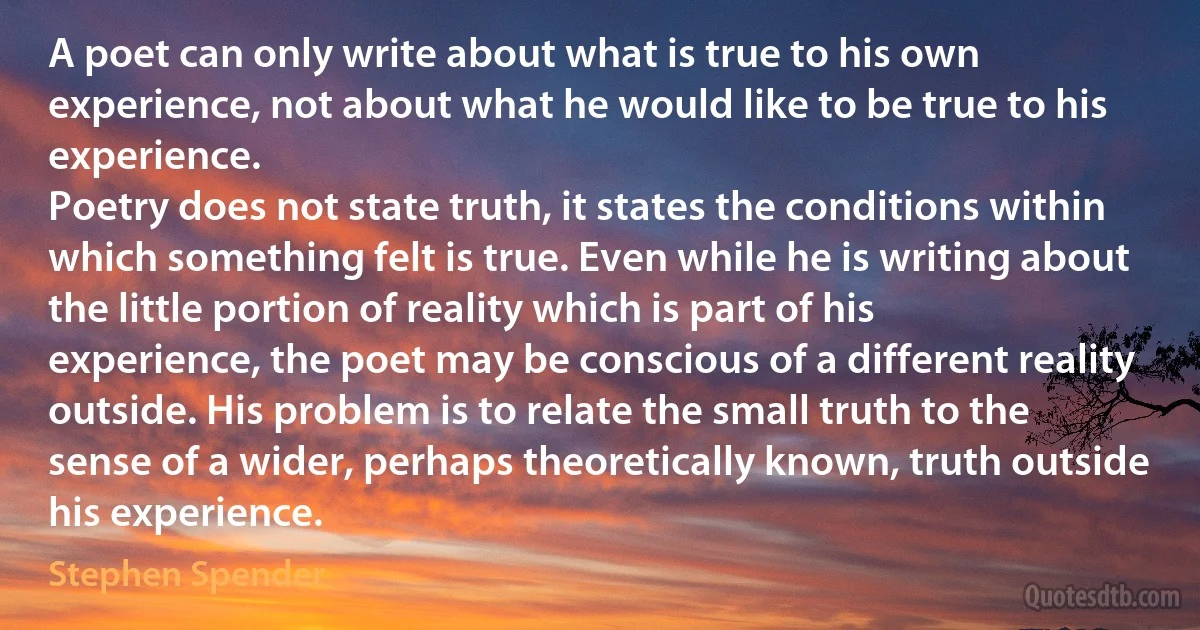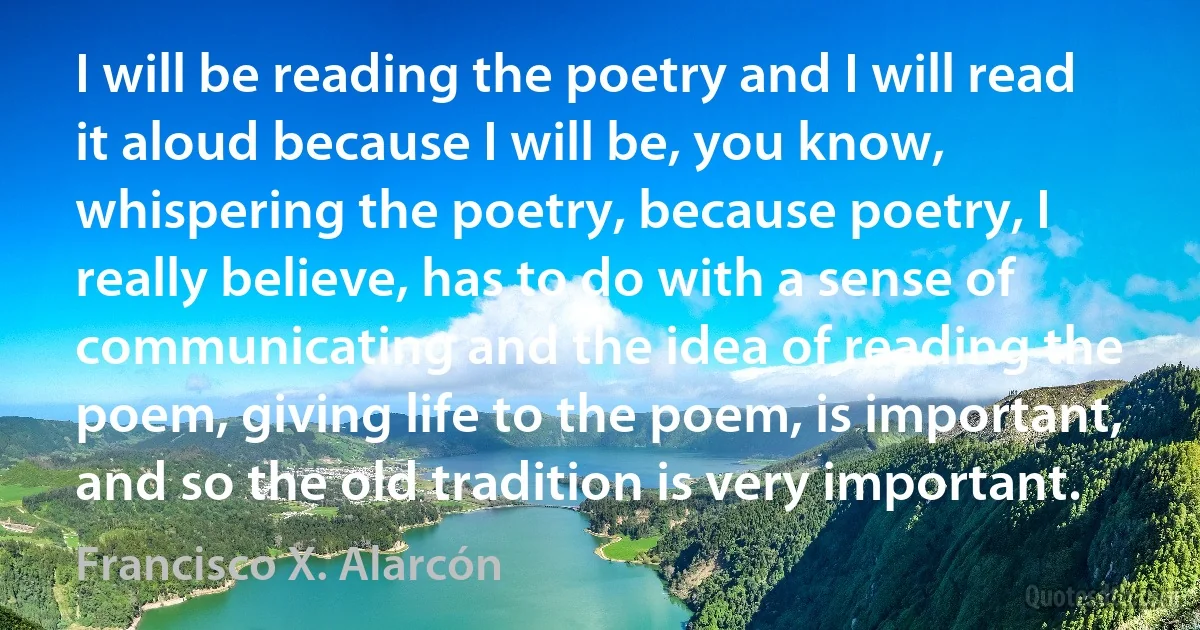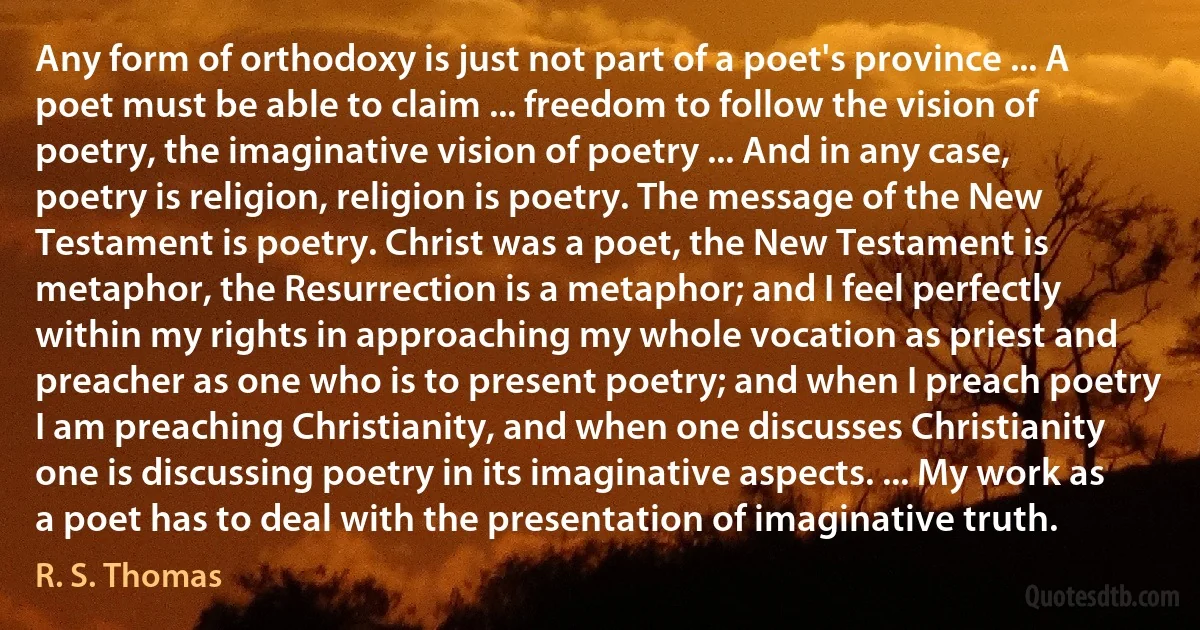Poetry Quotes - page 97
To us it does not seem that long ago, possibly because our children hear stories told around the fire of things which happened fifteen centuries back. Such stories carry an immediacy one does not get from books....”
"Which is why some countries carry such old grudges,” offered Marianne. "What children learn at their grandmas' knees they act upon as though it happened yesterday.”
He nodded gravely, even sadly. "Perhaps that is true. Those who have an oral tradition full of old wrongs and old revenge do seem to fight the same battles forever. If the Irish were not forever singing of their ancient wrongs-or writing poetry about it...well, we see the result in every morning's newspapers.

Sheri S. Tepper
There are essential and inessential insanities. The latter are solar in character, the former are linked to the moon. Inessential insanities are a brittle amalgamation of ambition, aggression, and pre-adolescent anxiety - garbage that should have been dumped long ago. Essential insanities are those impulses one instinctively senses are virtuous and correct, even though peers may regard them as coo-coo. Inessential insanities get one in trouble with one's self. Essential insanities get one in trouble with others. In fact, it may be essential. Poetry, the best of it, is lunar and is concerned with the essential insanities. Journalism is solar... and is devoted to the inessential.

Tom Robbins
... A lot of women have borne a lot of things; a lot of people have borne a lot of things. There's a certain kind of human that I want to be. There is not shame in my life. There is certainly misfortune, but I'm not the only one. I do know that. And sometimes, one of the things poetry can do is say to an audience: you are not alone. It can also speak for those who have not yet found their voice to speak. That's part of the human condition. And if we're going to talk about humans, why are we just going to talk about the pretty ones.

Lucille Clifton
The theater chose me. As I said, I started with poetry, and I also wrote criticism and dialogue. But I realized that I was most successful at dialogue. Perhaps I abandoned criticism because I am full of contradictions, and when you write an essay you are not supposed to contradict yourself. But in the theater, by inventing various characters, you can. My characters are contradictory not only in their language, but in their behavior as well.

Eugène Ionesco
She was not one of those poets who write verses-very few are; none but such as are poets through and through should ever do that. Verse is only words, the garment that makes the spirit of poetry visible to others; and poets who have but little of the spirit often fritter that little away in the effort to have it seen. But she was a poet in this, that the elemental passions of our nature were strong in her, and she bowed to them with childlike singleness of soul.

Jean Ingelow
An illustrious Circle, overcome by the artistic beauty of the forces under his command, threw aside his marshal's baton and his royal crown, exclaiming that he henceforth exchanged them for the artist's pencil. How great and glorious the sensuous development of these days must have been is in part indicated by the very language and vocabulary of the period. The commonest utterances of the commonest citizens in the time of the Colour Revolt seem to have been suffused with a richer tinge of word or thought; and to that era we are even now indebted for our finest poetry and for whatever rhythm still remains in the more scientific utterance of these modern days.

Edwin Abbott Abbott
You don't write a novel out of sheer pity any more than you blow a safe out of a vague longing to be rich. Compassion is all to the good, but vindictiveness is the verity Faulkner forgot: the organic force in every creative effort, from the poetry of Villon to the Brinks Express Robbery, that gives shape and color to all our dreams. [...] A certain ruthlessness and a sense of alienation from society is as essential to creative writing as it is to armed robbery. The strong-armer isn't out merely to turn a fast buck any more than the poet is out solely to see his name on the cover of a book, whatever satisfaction that event may afford him. What both need most deeply is to get even. And, of course, neither will.

Nelson Algren
Due to their parents' straitened circumstances, the youths [Rembrandt and Jan Lievens, living in Leiden, then] were compelled to take teachers whose fees were modest. Were these teachers to be confronted with their pupils today, they would feel just as abashed as those teachers who gave Virgil his first lessons in poetry, Cicero in rhetoric and Archimedes in mathematics. Let it however be said, with due respect for everyone's capacities and without detracting from anyone (for what is it to me?): these two owe nothing to their teachers but everything to their aptitude. Had they never received any tuition but been left to their own devices and suddenly been seized by the urge to paint, I am convinced that they would have risen to the same heights as they indeed have. It would be wrong to think that others have led them to this point.

Rembrandt
Kolakowski, as we will see, has clearly depicted the religious life and the forms of community constructed by the cultured strata of the Dutch bourgeoisie. Spinoza lives in this world, with a vast network of simple and sociable friendships and correspondences. But for certain determinate strata of the bourgeoisie the sweetness of the cultured and sedate life is accompanied, without any contradiction, by an association with a capitalist Power ('potestas'), expressed in very mature terms. This is the condition of a Dutch bourgeois man. We could say the same thing for the other genius of that age, Rembrandt van Rijn. On his canvases the power of light is concentrated with intensity on the figures of a bourgeois world in terrific expansion. It is a prosaic but very powerful society, which makes poetry without knowing it because it has the force to do so.

Rembrandt
One can put up with, indeed more than put up with, a certain amount of technical carelessness in Poetry, provided it be in other respects of a very high order, as not unoften, for instance, in Shakespeare and Byron. But similar blemishes in a picture would be all but fatal to it in the estimation of connoisseurs, since it would be the first thing that struck them in it.

Alfred Austin
But among all the discoveries and corrections probably none has resulted in a deeper influence on the human spirit than the doctrine of Copernicus.... Possibly mankind has never been demanded to do more, for considering all that went up in smoke as a result of realizing this change: a second Paradise, a world of innocence, poetry and piety: the witness of the senses, the conviction of a poetical and religious faith. No wonder his contemporaries did not wish to let all this go and offered every possible resistance to a doctrine which in its converts authorized and demanded a freedom of view and greatness of thought so far unknown indeed not even dreamed of.

Johann Wolfgang von Goethe
This is believed to be the completest list of this voluminous, prosiack, and driveling monk, that can be formed...in truth, and fact, these stupid and fatigueing productions, which by no means deserve the name of poetry, and their stil more stupid and disgusting author, who disgraces the name and patronage of his master Chaucer, are neither worth collecting (unless it be as typographical curiositys, or on account of the beautyful illuminations in some of his presentation copys), not even worthy of preservation: being only suitablely adapted "ad ficum & piperem," and other more bare and servile uses. How little he profited by the correction, or instructions of his great patron is manifest in almost every part of his elaborate drawlings, in which there are scarcely three lines together of pure and acurate metre.

Joseph Ritson
Though science makes no use for poetry, poetry is enriched by science. Poetry "takes up” the scientific vision and re-expresses its truths, but always in forms which compel us to look beyond them to the total object which is telling its own story and standing in its own rights. In this the poet and the philosopher are one. Using language as the lever, they lift thought above the levels where words perplex and retard its flight, and leave it, at last, standing face to face with the object which reveals itself.

L. P. Jacks
It seems as though he...has more of an interest, and more of a cultural capacity to reach out across the aisle in America, and to the world as a whole. As a wise man said once, you campaign in poetry and govern in prose...let's now see if he can deliver. Though I think he will soon find out that the vested interests of Washington are too stubborn for a relatively inexperienced politician such as himself to navigate. (Speaking about new U.S. President Barack Obama)

Munir Butt
I feel very much like Dirac: the idea of a personal God is foreign to me. But we ought to remember that religion uses language in quite a different way from science. The language of religion is more closely related to the language of poetry than to the language of science. True, we are inclined to think that science deals with information about objective facts, and poetry with subjective feelings. Hence we conclude that if religion does indeed deal with objective truths, it ought to adopt the same criteria of truth as science. But I myself find the division of the world into an objective and a subjective side much too arbitrary. The fact that religions through the ages have spoken in images, parables, and paradoxes means simply that there are no other ways of grasping the reality to which they refer. But that does not mean that it is not a genuine reality. And splitting this reality into an objective and a subjective side won't get us very far.

Niels Bohr
Poetry is not; or seems not to be. But it appears that among the great conflicts of this culture, the conflict in our attitude toward poetry stands clearly lit. There are no guards built up to hide it. We call see its expression, and we can see its effects upon us. We can see our own conflict and our own resource if we look, now, at this art, which has been made of all the arts the one least acceptable.
Anyone dealing with poetry and the love of poetry must deal, then, with the hatred of poetry, and perhaps even Ignore with the indifference which is driven toward the center. It comes through as boredom, as name-calling, as the traditional attitude of the last hundred years which has chalked in the portrait of the poet as he is known to this society, which, as Herbert Read says, "does not challenge poetry in principle it merely treats it with ignorance, indifference and unconscious cruelty."
Poetry is foreign to us, we do not let it enter our daily lives.

Muriel Rukeyser
There are ways in which poetry reaches the people who, for one reason or another, are walled off from it. Arriving in diluted forms, serving to point up an episode, to give to a climax an intensity that will carry it without adding heaviness, to travel toward the meaning of a work of graphic art, nevertheless poetry does arrive. And in the socially accepted forms, we may see the response and the fear, expressed without reserve, since they are expressed during enjoyment which has all the sanctions of society.
Close to song, poetry reaches us in the music we admit: the radio songs that flood our homes, the juke-boxes, places where we drink and eat, the songs of work for certain occupations, the stage-songs we hear as ticketed audience.

Muriel Rukeyser
Degas was discussing poetry with Mallarmé; "It isn't ideas I'm short of... I've got too many" [Ce ne sont pas les idées qui me manquent... J'en ai trop], said Degas. "But Degas," replied Mallarmé, "you can't make a poem with ideas. ... You make it with words." [Mais, Degas, ce n'est point avec des idées que l'on fait des vers. . . . C'est avec des mots.].

Stéphane Mallarmé



